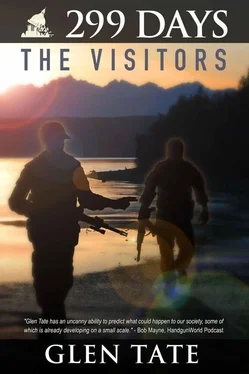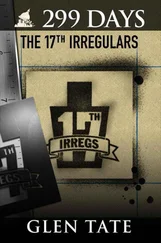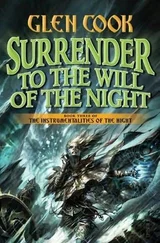Jeanie also heard rumblings about the gangs. Not just the street gangs that they’d all known about. The people at Camp Murray who oversaw gang activity were worried about the “super gangs,” which were large alliances of affiliated street gangs. Much like the mercenary military units, the super gangs were demanding more and more from the government to stay loyal. They wanted more food, fuel, medicine, and guns that they would then sell. They wanted more and more “territory,” which meant the government would lose control to them in a given area.
Some of the super gangs got tired of the measly pickings the government gave them and went into business for themselves. South Seattle and much of Tacoma were run by various super gangs, mostly Mexican, Asian, and Russian. The government sent some regular Army units from Ft. Lewis to stand up against the super gangs. These units wore ski masks to hide their identities just like the government troops fighting gangs in Mexico used to do. Those photographs stayed off the news. The Army units cleaned out the rebel gangs, at a terrible cost in casualties and equipment. The civilian casualties were horrendous. Another disturbing outcome of these raids was that, due to the lack of Army manpower, the gangs still loyal to the government—the competitors with the rebel gangs—had to be used to occupy the conquered parts of Seattle and Tacoma. The loyal gangs were perfectly happy to have some new territory. They went on a looting and raping spree in the new areas. The Army just watched, and some even joined in.
But, that was somewhere else, Jeanie told herself. Sure, it was only a few miles away, but it wasn’t where she lived. And it was only a small area of Seattle and Tacoma. That was not happening in the majority of the state, so most people were OK. Jeanie was trying to stay positive.
Then she had another thought. Winter was coming. It was sunny and nice out now, but wait until it got cold and rainy. It never got brutally cold in Washington State, but it did rain for months, which meant people would be huddled inside, coughing on each other. Communicable diseases would go through the roof. The people at Camp Murray had been planning for outbreaks of all kinds of third world diseases that no one thought could pop up in America. Cholera and typhoid were on the top of their lists.
One thing Jeanie did know from her work was that the government was definitely supplying the friendly urban areas much more than the rural areas. There was a rumor that the government would soon threaten to shut off utilities to rural areas to get them to comply. Jeanine didn’t know if that was true, but she did know one thing. Almost all the food and supplies were delivered to the Seattle area and Olympia. In fact, she was told to brag about this to her urban and suburban VIP tour guests. She would tell them that the government was “doing the most for as many as possible,” which meant feeding the cities. In fact, now that she thought about it, she never had VIPs from rural areas. It was as if the areas outside Seattle, the suburbs, and Olympia didn’t exist anymore.
They kind of didn’t. There was no government out there. Local government still existed in rural areas, though it was barely functioning. Local law enforcement still operated, but mostly with the help of volunteers. Some fire departments still operated out there. House fires were a problem with all the looting and crime. Criminals would set a house on fire to destroy evidence, eliminate witnesses, or intimidate residents.
Out in the rural areas, there were no social services, roads departments, tax collection, or anything like that. The most that many cities and towns in rural areas could manage was a semi-professional police force, and maybe a small fire department. Libraries? Parks? Forget about it. The thought of a functioning library or park seemed absurd, given all the other needs of the people in a town.
The parks reminded Jeanie of the paras, the paramilitary groups operating on all sides, who were rumored to be killing people in parks. All the parks of her childhood were probably now full of bodies, she thought.
Although she no longer attended the briefings, she still heard murmurings among staff, and those who were huddled in the conference rooms at Camp Murray were really worried about the paras. Not only because they signified lawlessness and because people were getting killed, but more importantly, because many paras were said to be targeting Loyalists, who were the people in that room. Going after the paras was self-defense for the Loyalists.
The paras also introduced a lot of uncertainty. People wondered if they could trust the person they were giving sensitive information to. They worried he or she may tell the paras. And, if so, which paras? It slowed down operations. A person’s loyalty had to be checked and double checked before they could be trusted to act. It also meant that some of the government’s best plans were thwarted by para informers, and not just informers who were working directly for paras. Regular people with no political agenda were afraid of paras. They would give paras information out of fear even if they didn’t support that particular para group’s politics.
To try to control them, especially the ones threatening the Loyalists, the government used its insurrection powers to round up suspected Patriots and paras. The government didn’t have enough troops and professional police to do this, so the task fell on the pathetic, but numerous, Freedom Corps.
Most of the suspects who the FCorps rounded up were sent to hundreds of hastily created medium-security “temporary detention facilities” for a few weeks and then released. Quick releases were required because it cost too much to feed them. Suspects didn’t actually eat too well in the temporary detention facilities, but even a meager diet was costly.
The main penalty was taking away suspects’ FCards. Arresting them was done more to intimidate others than to actually incarcerate the suspects. That’s about all the government could do.
All of the insurrection powers exercised by the government were “temporary.” Order had to be restored, Jeanie kept telling herself. She realized she had a personal stake in supporting all the emergency powers. If strong measures weren’t taken, the Patriots (or terrorists, or paras, or whatever they were) would kill every government official. Like her.
Oh God, Jeanie thought. Where does this all end? There were so many people killing each other already. People can’t just forget all the killings and get back to normal. This could never be “temporary.” It will continue until one side wins, and that side wipes out the other side.
She was starting to wonder if she’d picked the right side.
Chapter 145
Tom’s “New Normal”
(June 4)
The rooster woke Tom Foster. He was getting used to it. In fact, the rooster crowing at dawn, which was about 4:30 a.m. this time of year, was feeling normal. He never thought it would. Now it was part of his day.
What a change he’d been through. Just a month ago, he was an executive for the state’s largest business association, the Washington Association of Business. He lived in a nice home in Olympia and ate at restaurants all the time; business lunches and dinners were part of his job. He never really did anything outdoors. He kept in decent shape, but was definitely a city boy.
Not anymore. Now he was getting up at the crack of dawn out at the Prosser Farm. He worked with his hands outside all day. He ate what he hunted or milked. He was growing food in his garden, too. His hands were starting to callus. At first, he was sore from all the new physical activity, but his body was quickly becoming accustomed to the labor. He was getting in great shape, and he was tan. He felt pretty good.
Читать дальше











